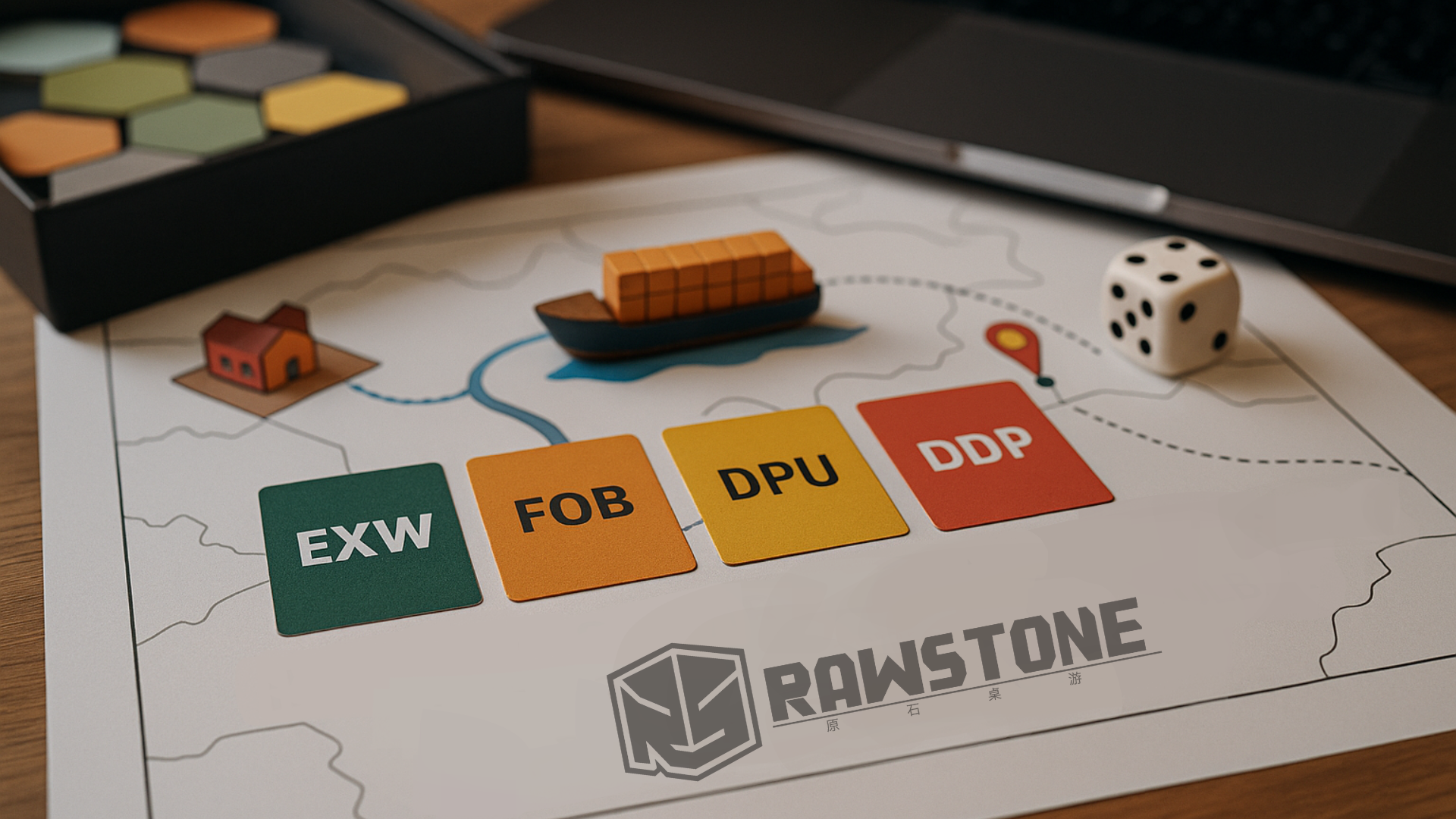

Dive into our insights for publishers & designers!


Date: 20/06/2025
Incoterms for Board Game Manufacturing: A Smart Guide to Global Shipping and Delivery
Incoterms for board game manufacturing have become a crucial consideration as global logistics and trade dynamics grow more complex. For companies relying on international production partners, particularly in the tabletop game sector, understanding how Incoterms affect shipping, customs, and final delivery is key to managing costs and minimizing risk.
While many production conversations focus on freight rates or lead times, Incoterms 2020 remain a foundational tool for structuring international transactions. These rules, established by the International Chamber of Commerce, clearly define who is responsible for transportation, duties, insurance, and risk at each stage of the delivery process. Selecting the right Incoterm can have a direct impact on project planning, pricing, and reliability.
At Rawstone, we believe that understanding and choosing the right Incoterms is essential for mitigating risk and ensuring transparent, cost-effective deliveries. Here’s how.
Understanding Incoterms: A Quick Overview for Game Makers
Incoterms (International Commercial Terms) are globally recognized standards that define the roles of buyers and sellers in international trade. The latest version – Incoterms 2020 – specifies who is responsible for shipping, export/import duties, insurance, and delivery.
In board game production, two Incoterms are especially common:
EXW (Ex Works): The buyer takes full responsibility from the moment goods leave the manufacturer’s facility, including all customs and freight arrangements.
FOB (Free On Board): The seller handles transport to the port and loading onto the vessel. From that point, the buyer assumes responsibility for the goods.
These are often preferred for their simplicity and control, but may not always be ideal in an unpredictable global trade environment.
Why Incoterms Matter in a Changing Global Supply Chain
In an increasingly complex environment for international logistics, EXW and FOB can place a heavy burden on the buyer. For small to mid-sized publishers, especially those operating without dedicated logistics teams, this can lead to:
- Unexpected customs and import duties
- Delays due to incomplete documentation
- Increased landed costs due to a lack of cost visibility
- Greater operational risk if freight handling goes wrong
As a result, there’s growing interest in alternative Incoterms that offer more clarity, stability, and distribution-ready delivery options.
Considering Alternatives: Could DPU and DDP Offer More Stability?
For publishers looking to reduce risk and gain better cost predictability in today’s volatile trade environment, alternative Incoterms like DPU (Delivered at Place Unloaded) and DDP (Delivered Duty Paid) are worth exploring.
- DPU allows the seller to handle the entire shipping process, including unloading the goods at the agreed destination, offering buyers a simplified and more transparent delivery framework.
- DDP goes a step further, with the seller managing transportation, customs clearance, and import duties, ensuring goods arrive ready for distribution with minimal buyer-side involvement.
These Incoterms can be especially valuable for small to mid-sized publishers or for those expanding into new international markets. By shifting responsibilities upstream, they can reduce unexpected costs, streamline timelines, and simplify internal operations.
Choosing whether to work under DPU or DDP depends on a company’s internal capabilities and appetite for handling logistics complexity. Publishers interested in these models should consider discussing them with their manufacturing partners to determine the best strategic fit.
How to Choose the Right Incoterms in Board Game Manufacturing
Selecting the right Incoterm depends on a company’s logistical capabilities, risk management strategy, and how much control it wants to retain during the shipping process.
- EXW may suit companies with robust logistics departments capable of managing international shipping and customs clearance.
- FOB offers a middle ground, with the seller handling initial shipping responsibilities, but the buyer still managing significant aspects upon arrival.
- DPU and DDP are ideal for companies seeking a hassle-free experience, with the seller managing most, if not all, logistics and associated costs.
Discussing Incoterm options early in the production planning phase can help ensure smoother deliveries and avoid surprises down the line, especially when tariffs and customs play a critical role in final costs.
Conclusion
In a market shaped by supply chain complexity, increased compliance requirements, and rising fulfillment costs, Incoterms for board game manufacturing are not just technical definitions. They’re strategic decisions.
By understanding how terms like EXW, FOB, DPU, and DDP affect responsibilities and risks, publishers can make smarter choices that protect their margins, increase operational control, and deliver products more efficiently to their players worldwide.
Stay in the Loop!
Want updates on market trends, sustainability best practices, and new manufacturing opportunities?
👉 Subscribe to our newsletter http://eepurl.com/g3LCXT
Get monthly insights, exclusive resources, and behind-the-scenes stories from our projects around the world.
you might also be interested...
How to Bring Board Games to China: Licensing, Localization, and Market Entry Strategies for Indie Publishers
Learn how to bring board games to China through expert localization, licensing strategy, and integrated manufacturing. A complete guide for...
> Read MoreBoard Games and Stress Relief | How Play Supports Wellbeing
Recent studies show that both board games and role-playing games can reduce stress, improve social connection, and support emotional wellbeing...
> Read MoreWhat Matters Most in Board Game Manufacturing: Cost, Quality, or Sustainability?
Discover how board game publishers weigh cost, quality, and sustainability when choosing a manufacturer.
> Read MoreFrom Worker Placement to Tile Placement: A Guide to the Most Popular Board Game Mechanics
Discover how to design sustainable board game packaging that’s eco-friendly, functional, and cost-effective!
> Read More



